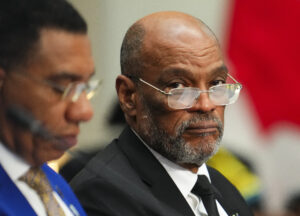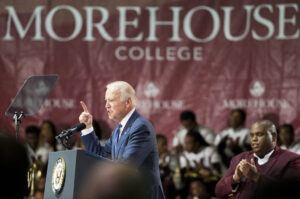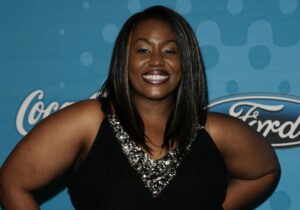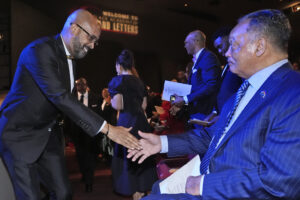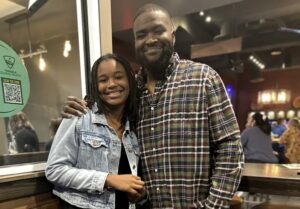As the country celebrates the life of the late Rev. Dr. Martin Luther King Jr., one academic is thinking about how King is present in so much of world events today.
Dr. Lerone Martin is one year in as director of the Martin Luther King, Jr., Research & Education Institute, a non-profit created 17 years ago to edit and preserve the papers of King, who was assassinated at a Memphis motel in 1968. The institute is on the grounds of Stanford University in Palo Alto, California.
One year ago, Martin replaced the institute’s retiring founding director, Dr. Clayborne Carson, who began working on preserving and editing King’s letters, sermons, writings and more after King’s widow, the late Coretta Scott King, asked him.

Now, so many years later, Martin, 43, is part of a new younger guard of leaders that includes 42-year-old Tamika Mallory, a founder of the Women’s March and organizer in the campaign to bring Brittney Griner back home from a Russian prison, newly elected Earle, Arkansas, Mayor Jaylen Smith, 18, and Rev. James Woodall, 28, who was the youngest state president of the Georgia NAACP in history.
Martin has written widely about religion and civil rights. In addition to serving as the Martin Luther King, Jr. Centennial Chair with Stanford’s Department of Religious Studies, he also has served as director of American Culture Studies at Washington University in St. Louis.
Martin recently chatted with NABJ Black News & Views about the reach of King’s legacy.
NABJ BNV: What ways of Dr. King have been handed down to young activists today?
Martin: I think one of the things that has continued for Martin King from his time in the ‘60s to today is I think the savvy use of media – the ability to try to draw media attention to various injustices. Dr. King didn’t have social media, he didn’t have 24-hour news like CNN and things like that. He pretty much had radio. He was very strategic about using his celebrity and notoriety to try to bring attention to certain causes around the country.
Communities were protesting across the country but often wouldn’t get the traction until King showed up.
I think now the young adults are very savvy about also using the media that they have at their reach.
I’m reminded I was living in St. Louis when Michael Brown was murdered and I remember vividly not hearing about it in the news, but through social media. The hashtag gained such force, then local news began to cover it. It started from showing the images magine of of this young boy’s body in the middle of the street.
NABJ BNV: What would Dr. King think about the state of the country today and about the actions or inaction we are making toward change?
Martin: I think Martin King would applaud a number of aspects – (such as) the advancement of African Americans in positions of power and access – but I think he would also be disappointed in that we as a country seemed to be shocked that there is a backlash to some of the advancements after George Floyd. Martin King always talked about how America has a schizophrenic personality when it comes to race and injustice to this country. It was always one step forward, two steps back.
King said America’s always had a kind of whiplash relationship to these things. I think King would be disappointed and I’ve said before: Why are you all surprised? There are forces of ill will that are now galvanized and organized.
There’s the direct backlash to DEI (diversity, equity and inclusion) that has been cooked up under the guise of critical race theory. State governors are using CRT or “wokeness” as a way to push back on DEI.
So I think he would be disappointed.
Then you think about a place like Georgia which, for the first time in its history, elects an African American senator and a Jewish senator and literally the next day, January 6 happened.
NABJ BNV: You are young yourself at age 43. Where do you think young people should be looking today in terms of direction in ways to protest and make change?
Martin: As an historian I would say they should be looking to those who came before us as conversation partners – not that Martin or Fannie Lou Hamer or Harriet Tubman or Malcolm are going to provide us the answers wrapped up in a nice bow, but we should converse with them in a manner in which we can look at what they did, what was successful, areas where weren’t successful, so that way as we confront our own issues, we don’t have to confront them empty-handed.. Principles and martin king, how he was successful but wasn’t as successful in albany georgia, successful in selma but not chicago. Itg hink we should use them as conversation partners. Not wrapped
NABJ BNV: Why did some of King’s strategies work and some did not?
Martin: Albany, Georgia, 1962 – what they learned from Albany was nothing really changed when they came and left. They cast their net too widely. They came to albany and said, “We are going to desegregate and break down Jim Crow in Albany, Georgia. It was (late pastor and civil rights leader) Wyatt Tee Walker who said they learned great lessons from that, and then when they came to Birmingham, they focused on the downtown stores around Easter. They knew that would get attention. They knew that would cause a crisis.
Wyatt Tee Walker said he’d gone downtown and studied how many seats were at the lunch counters, how long it would take a younger person or older person to sit down at the lunch counter. … They planned and they were very focused in their efforts. When we watch the images that we see of these protesters, oftentimes we get the idea that folks just showed up, but when you talk to the John Lewises (and other civil rights leaders), you realize there was a great deal of planning. (These efforts were) proven to gain some traction.
NABJ BNV: How will you spend the Martin Luther King holiday?
Martin: On Sunday, my family and I will go worship at Stanford Memorial Church. We will participate in a worship service in honor of Martin King, and then on Monday, I’m speaking at James Madison University.
NABJ BNV: What is the theme of your speech?
Martin: I think the title of the message will be just the work and legacy of Martin Luther King Jr.
NABJ BNV: Any final words?
Martin: My hope is that folks will use this opportunity to try to learn something new about Martin Luther King Jr. Don’t just be satisfied by reading the “I have a dream” speech but to learn something new. Our website, kinginstitute.stanford.edu, is an excellent resource for reading and learning about Martin Luther King Jr. and I would only end by saying that I hope that the holiday inspires folks to direct their efforts, their talent toward making their own local community a better place.
Everyone is not meant to be a speaker, but there are so many different aspects that come into play that make a successful social justice movement. We need all hands on deck.


